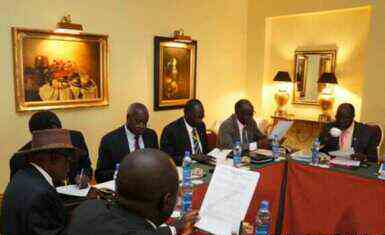S. Sudan seeks support for IGAD protocol on agreed principles
September 1, 2014 (JUBA) – South Sudanese government is currently seeking support for the protocol of agreed principle proposed by the East African regional bloc (IGAD), which is mediating its talks with the opposition led by ex-vice president Riek Machar.

The protocol, which the government had signed and rejected by the rebels, threatened the warring parties with sanctions should they fail to implement an earlier cessation-of-hostilities agreement.
It proposes creation of a prime minister position to be filled by the person whose duties, functional roles and responsibilities will be negotiated by the warring parties and the other stakeholders.
However, the IGAD proposal stipulates that the prime minister will not be eligible for future elections after the interim administration.
“The prime minister will not be eligible to stand for any public office in the national elections at the end of the transitional period”, partly reads IGAD’s proposal also obtained by Sudan Tribune.
“Establishing a transitional government of national unity offers the best chance for the people of South Sudan to take the country forward”, it adds.
It bears names of Ethiopia’s prime minister, Haile Mariam Dessalegn, presidents Salva Kiir (South Sudan), Uhuru Kenyatta (Kenya), Yoweri Museveni (Uganda), Ismail Omar Guelleh (Djibouti), Sudan’s first vice-president, Bakri Hassan Saleh Mohammed and Somalia’s prime minister, Abdiweli Sheikh Ahmed.
Ambassador Seyoum Mesfin, head of the mediators, Kenyan General Lazaro Sumbeiywo and Sudanese General, Mohamed Ahmed El-Dabi are included in the IGAD proposal as witnesses.
Rebel leader Machar did not, however, sign the document, claiming the he was given a blank paper, which demanded for his signature.
In support of this proposal, several government officials on Monday called on the citizens as well as regional leaders and the international community to support the proposal to end conflict.
“There is no time to wait. Time is so tight and we don’t have any to waste particularly given the extremely difficult security and humanitarian situation in which our people have been subjected to,” cabinet affairs minister, Martin Elia Lomuro said on Monday.
“The IGAD protocol of agreed principles provides a clear guideline basis for negotiation and I hope our people with the international community would come out to support this document”, he added.
Lomuro explained that regional and the international community support of IGAD document as the basis of negotiation between the rival parties would accelerate the way out for the country and its leadership to achieve a lasting peace.
Mark Nyipuoc, the deputy speaker of national parliament, on the other hand, said the role of the international community in support of the IGAD proposal was critical, pointing out that there was need to urgently engage rebels on the document in order to end suffering.
“There is no question about commitment of the government. There is also no question about the desire for peace and stability by our people. Indeed our people are wishing that the earlier this peace is signed before the end of the year the better for them to return to their homes, especially those from the affected areas and those in the UN camps,” Nyipuoc exclusively told Sudan Tribune Monday.
“What is required now is the role of the international community, which is critical. The international community needs to come out and show serious commitment and engage the rebels to accept the IGAD protocol of agreed principles as the basis of negotiation”, he added.
Nyipouc said the country’s lawmakers fully support the national committees established to facilitate peace talks in the country.
“Differences are never resolved through violence, people talk and as the government we accept dialogue as the means to resolving political or social dispute arising from misunderstanding, which is what our vice president is doing now,” said the deputy speaker.
He also disclosed the country’s vice-president, James Wani Igga was due to travel to South Sudan’s Western Bahr el Ghazal state to garner community support for peace and reconciliation processes.
“This shows commitment of the government to resolve all differences and disputes through peaceful dialogue”, stressed Nyipuoc.
OPPOSITION PROTEST IGAD PROPOSAL
However, opposition figures have claimed that IGAD proposal favoured the government under president Kiir at the expense of addressing fundamental matters, including failing to mention whether the latter would be eligible to contest in the future elections.
“This proposal is a big travesty and embarrassment if not direct insult to the people of South Sudan. It exposed the level of ability of the IGAD member countries to fairly resolve issues which caused this war. It fails to address fundamental matters. The status quo it seems to promote cannot stand,” Ayii Ayii Akol, the opposition’s deputy head of humanitarian affairs committee told Sudan Tribune Monday.
“Progress in the democratic reforms and political process cannot be compromised for positions in the government,” he added.
Akol said it was high time the mediators took into account the suffering of the population, by taking “decisive and strong steps to put to an end the despotic and dictatorial tendencies of Salva Kiir.”
“This document, which our leadership has not signed, is obviously an elusive proposal. It does not address fundamental matters and this is a reason why it took time for us to get to the point where we are in now, but we are hopeful that there is an opportunity to resolve these issues. The only thing our people ask is for mediators to take their role more seriously,” said Akol.
“Our people want them to be mediators not negotiators. Actually mediators are seen to have taken sides and positions,” he added.
(ST)
